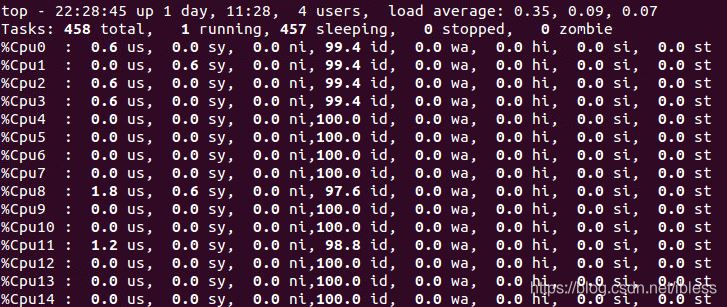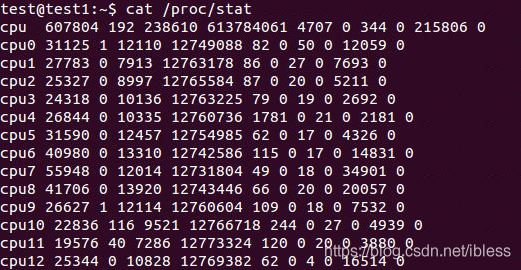Maison >Tutoriel système >Linux >Explication détaillée du cas de calcul de l'utilisation spécifique du processeur sous Linux
Explication détaillée du cas de calcul de l'utilisation spécifique du processeur sous Linux
- PHPzavant
- 2023-12-22 10:34:111799parcourir
Calculez l'utilisation spécifique du processeur sous Linux. Référence d'extension de solution requise
.Demande
Sous Linux, vous pouvez utiliser la commande top pour vérifier le CPU occupé par un certain processus, ou vous pouvez vérifier l'utilisation d'un certain CPU (utilisez d'abord la commande top, puis appuyez sur la touche numérique "1" pour afficher l'utilisation de chaque CPU), comme suit Photo :

Et notre besoin est : Comment obtenir un taux d'occupation CPU ?
Solution
1. Connaissances de base
Vous pouvez vérifier l'utilisation de chaque processeur dans /proc/stat, comme indiqué ci-dessous :

La signification des dix chiffres après cpu (0/1/2/…) est la suivante :
/proc/stat
kernel/system statistics. Varies with architecture.
Common entries include:
user nice system idle iowait irq softirq steal guest guest_nice
cpu 4705 356 584 3699 23 23 0 0 0 0
cpu0 1393280 32966 572056 13343292 6130 0 17875 0 23933 0
The amount of time, measured in units of USER_HZ
(1/100ths of a second on most architectures, use
sysconf(_SC_CLK_TCK) to obtain the right value), that
the system ("cpu" line) or the specific CPU ("cpuN"
line) spent in various states:
user (1) Time spent in user mode.
nice (2) Time spent in user mode with low priority
(nice).
system (3) Time spent in system mode.
idle (4) Time spent in the idle task. This value
should be USER_HZ times the second entry in the
/proc/uptime pseudo-file.
iowait (since Linux 2.5.41)
(5) Time waiting for I/O to complete. This
value is not reliable, for the following rea‐
sons:
1. The CPU will not wait for I/O to complete;
iowait is the time that a task is waiting for
I/O to complete. When a CPU goes into idle
state for outstanding task I/O, another task
will be scheduled on this CPU.
2. On a multi-core CPU, the task waiting for I/O
to complete is not running on any CPU, so the
iowait of each CPU is difficult to calculate.
3. The value in this field may decrease in cer‐
tain conditions.
irq (since Linux 2.6.0-test4)
(6) Time servicing interrupts.
softirq (since Linux 2.6.0-test4)
(7) Time servicing softirqs.
steal (since Linux 2.6.11)
(8) Stolen time, which is the time spent in
other operating systems when running in a virtu‐
alized environment
guest (since Linux 2.6.24)
(9) Time spent running a virtual CPU for guest
operating systems under the control of the Linux
kernel.
guest_nice (since Linux 2.6.33)
(10) Time spent running a niced guest (virtual
CPU for guest operating systems under the con‐
trol of the Linux kernel).
2. Calculez l'utilisation spécifique du processeur
Avec les connaissances de base ci-dessus, nous pouvons ensuite calculer l'utilisation spécifique du processeur. La méthode de calcul spécifique est la suivante :
Total CPU time since boot = user+nice+system+idle+iowait+irq+softirq+steal Total CPU Idle time since boot = idle + iowait Total CPU usage time since boot = Total CPU time since boot - Total CPU Idle time since boot Total CPU percentage = Total CPU usage time since boot/Total CPU time since boot * 100%
Avec la formule de calcul ci-dessus, il n'est pas difficile de calculer une certaine utilisation du processeur ou l'utilisation totale du processeur du système.
Exemple : Calculez l'utilisation globale du processeur du système
Tout d'abord, obtenez les valeurs globales de l'utilisateur du système, nice, system, ralenti, iowait, irq, softirq, voler, invité, invité_nice de /proc/stat à t1, et obtenez le temps total du processeur depuis le démarrage à ce moment ( enregistré comme total1) et le temps d'inactivité total du processeur depuis le démarrage (enregistré comme inactif1).
Deuxièmement, obtenez le temps total d'inactivité du processeur depuis le démarrage (enregistré comme total2) et le temps d'inactivité total du processeur depuis le démarrage (enregistré comme inactif2) du système à t2 à partir de /proc/stat. (La méthode est la même que l'étape précédente)
Enfin, calculez l'utilisation totale du processeur du système entre t2 et t1. C'est à dire :
Pourcentage de CPU entre t1 et t2 = ((total2-total1)-(idle2-idle1))/(total2-total1)*100%
Parmi eux, ((total2-total1)-(idle2-idle1)) est en fait le temps pendant lequel le processeur du système est occupé entre t1 et t2 (durée totale - temps d'inactivité).
Ce qui suit est un script qui calcule l'utilisation du processeur sur une période donnée :
#!/bin/bash
# by Paul Colby (http://colby.id.au), no rights reserved ;)
PREV_TOTAL=0
PREV_IDLE=0
while true; do
# Get the total CPU statistics, discarding the 'cpu ' prefix.
CPU=(`sed -n 's/^cpu\s//p' /proc/stat`)
IDLE=${CPU[3]} # Just the idle CPU time.
# Calculate the total CPU time.
TOTAL=0
for VALUE in "${CPU[@]}"; do
let "TOTAL=$TOTAL+$VALUE"
done
# Calculate the CPU usage since we last checked.
let "DIFF_IDLE=$IDLE-$PREV_IDLE"
let "DIFF_TOTAL=$TOTAL-$PREV_TOTAL"
let "DIFF_USAGE=(1000*($DIFF_TOTAL-$DIFF_IDLE)/$DIFF_TOTAL+5)/10"
echo -en "\rCPU: $DIFF_USAGE% \b\b"
# Remember the total and idle CPU times for the next check.
PREV_TOTAL="$TOTAL"
PREV_IDLE="$IDLE"
# Wait before checking again.
sleep 1
done
Agrandir
Dans le noyau, les fonctions d'implémentation pour les fichiers dans /proc/stat sont les suivantes :
附注:内核版本3.14.69,文件为 /fs/proc/stat.c
#include <linux/cpumask.h>
#include <linux/fs.h>
#include <linux/init.h>
#include <linux/interrupt.h>
#include <linux/kernel_stat.h>
#include <linux/proc_fs.h>
#include <linux/sched.h>
#include <linux/seq_file.h>
#include <linux/slab.h>
#include <linux/time.h>
#include <linux/irqnr.h>
#include <asm/cputime.h>
#include <linux/tick.h>
#ifndef arch_irq_stat_cpu
#define arch_irq_stat_cpu(cpu) 0
#endif
#ifndef arch_irq_stat
#define arch_irq_stat() 0
#endif
#ifdef arch_idle_time
static cputime64_t get_idle_time(int cpu)
{
cputime64_t idle;
idle = kcpustat_cpu(cpu).cpustat[CPUTIME_IDLE];
if (cpu_online(cpu) && !nr_iowait_cpu(cpu))
idle += arch_idle_time(cpu);
return idle;
}
static cputime64_t get_iowait_time(int cpu)
{
cputime64_t iowait;
iowait = kcpustat_cpu(cpu).cpustat[CPUTIME_IOWAIT];
if (cpu_online(cpu) && nr_iowait_cpu(cpu))
iowait += arch_idle_time(cpu);
return iowait;
}
#else
static u64 get_idle_time(int cpu)
{
u64 idle, idle_time = -1ULL;
if (cpu_online(cpu))
idle_time = get_cpu_idle_time_us(cpu, NULL);
if (idle_time == -1ULL)
/* !NO_HZ or cpu offline so we can rely on cpustat.idle */
idle = kcpustat_cpu(cpu).cpustat[CPUTIME_IDLE];
else
idle = usecs_to_cputime64(idle_time);
return idle;
}
static u64 get_iowait_time(int cpu)
{
u64 iowait, iowait_time = -1ULL;
if (cpu_online(cpu))
iowait_time = get_cpu_iowait_time_us(cpu, NULL);
if (iowait_time == -1ULL)
/* !NO_HZ or cpu offline so we can rely on cpustat.iowait */
iowait = kcpustat_cpu(cpu).cpustat[CPUTIME_IOWAIT];
else
iowait = usecs_to_cputime64(iowait_time);
return iowait;
}
#endif
static int show_stat(struct seq_file *p, void *v)
{
int i, j;
unsigned long jif;
u64 user, nice, system, idle, iowait, irq, softirq, steal;
u64 guest, guest_nice;
u64 sum = 0;
u64 sum_softirq = 0;
unsigned int per_softirq_sums[NR_SOFTIRQS] = {0};
struct timespec boottime;
user = nice = system = idle = iowait =
irq = softirq = steal = 0;
guest = guest_nice = 0;
getboottime(&boottime);
jif = boottime.tv_sec;
for_each_possible_cpu(i) {
user += kcpustat_cpu(i).cpustat[CPUTIME_USER];
nice += kcpustat_cpu(i).cpustat[CPUTIME_NICE];
system += kcpustat_cpu(i).cpustat[CPUTIME_SYSTEM];
idle += get_idle_time(i);
iowait += get_iowait_time(i);
irq += kcpustat_cpu(i).cpustat[CPUTIME_IRQ];
softirq += kcpustat_cpu(i).cpustat[CPUTIME_SOFTIRQ];
steal += kcpustat_cpu(i).cpustat[CPUTIME_STEAL];
guest += kcpustat_cpu(i).cpustat[CPUTIME_GUEST];
guest_nice += kcpustat_cpu(i).cpustat[CPUTIME_GUEST_NICE];
sum += kstat_cpu_irqs_sum(i);
sum += arch_irq_stat_cpu(i);
for (j = 0; j < NR_SOFTIRQS; j++) {
unsigned int softirq_stat = kstat_softirqs_cpu(j, i);
per_softirq_sums[j] += softirq_stat;
sum_softirq += softirq_stat;
}
}
sum += arch_irq_stat();
seq_puts(p, "cpu ");
seq_put_decimal_ull(p, ' ', cputime64_to_clock_t(user));
seq_put_decimal_ull(p, ' ', cputime64_to_clock_t(nice));
seq_put_decimal_ull(p, ' ', cputime64_to_clock_t(system));
seq_put_decimal_ull(p, ' ', cputime64_to_clock_t(idle));
seq_put_decimal_ull(p, ' ', cputime64_to_clock_t(iowait));
seq_put_decimal_ull(p, ' ', cputime64_to_clock_t(irq));
seq_put_decimal_ull(p, ' ', cputime64_to_clock_t(softirq));
seq_put_decimal_ull(p, ' ', cputime64_to_clock_t(steal));
seq_put_decimal_ull(p, ' ', cputime64_to_clock_t(guest));
seq_put_decimal_ull(p, ' ', cputime64_to_clock_t(guest_nice));
seq_putc(p, '\n');
for_each_online_cpu(i) {
/* Copy values here to work around gcc-2.95.3, gcc-2.96 */
user = kcpustat_cpu(i).cpustat[CPUTIME_USER];
nice = kcpustat_cpu(i).cpustat[CPUTIME_NICE];
system = kcpustat_cpu(i).cpustat[CPUTIME_SYSTEM];
idle = get_idle_time(i);
iowait = get_iowait_time(i);
irq = kcpustat_cpu(i).cpustat[CPUTIME_IRQ];
softirq = kcpustat_cpu(i).cpustat[CPUTIME_SOFTIRQ];
steal = kcpustat_cpu(i).cpustat[CPUTIME_STEAL];
guest = kcpustat_cpu(i).cpustat[CPUTIME_GUEST];
guest_nice = kcpustat_cpu(i).cpustat[CPUTIME_GUEST_NICE];
seq_printf(p, "cpu%d", i);
seq_put_decimal_ull(p, ' ', cputime64_to_clock_t(user));
seq_put_decimal_ull(p, ' ', cputime64_to_clock_t(nice));
seq_put_decimal_ull(p, ' ', cputime64_to_clock_t(system));
seq_put_decimal_ull(p, ' ', cputime64_to_clock_t(idle));
seq_put_decimal_ull(p, ' ', cputime64_to_clock_t(iowait));
seq_put_decimal_ull(p, ' ', cputime64_to_clock_t(irq));
seq_put_decimal_ull(p, ' ', cputime64_to_clock_t(softirq));
seq_put_decimal_ull(p, ' ', cputime64_to_clock_t(steal));
seq_put_decimal_ull(p, ' ', cputime64_to_clock_t(guest));
seq_put_decimal_ull(p, ' ', cputime64_to_clock_t(guest_nice));
seq_putc(p, '\n');
}
seq_printf(p, "intr %llu", (unsigned long long)sum);
/* sum again ? it could be updated? */
for_each_irq_nr(j)
seq_put_decimal_ull(p, ' ', kstat_irqs_usr(j));
seq_printf(p,
"\nctxt %llu\n"
"btime %lu\n"
"processes %lu\n"
"procs_running %lu\n"
"procs_blocked %lu\n",
nr_context_switches(),
(unsigned long)jif,
total_forks,
nr_running(),
nr_iowait());
seq_printf(p, "softirq %llu", (unsigned long long)sum_softirq);
for (i = 0; i < NR_SOFTIRQS; i++)
seq_put_decimal_ull(p, ' ', per_softirq_sums[i]);
seq_putc(p, '\n');
return 0;
}
static int stat_open(struct inode *inode, struct file *file)
{
size_t size = 1024 + 128 * num_possible_cpus();
char *buf;
struct seq_file *m;
int res;
/* minimum size to display an interrupt count : 2 bytes */
size += 2 * nr_irqs;
/* don't ask for more than the kmalloc() max size */
if (size > KMALLOC_MAX_SIZE)
size = KMALLOC_MAX_SIZE;
buf = kmalloc(size, GFP_KERNEL);
if (!buf)
return -ENOMEM;
res = single_open(file, show_stat, NULL);
if (!res) {
m = file->private_data;
m->buf = buf;
m->size = ksize(buf);
} else
kfree(buf);
return res;
}
static const struct file_operations proc_stat_operations = {
.open = stat_open,
.read = seq_read,
.llseek = seq_lseek,
.release = single_release,
};
static int __init proc_stat_init(void)
{
proc_create("stat", 0, NULL, &proc_stat_operations);
return 0;
}
fs_initcall(proc_stat_init);
Référence
http://man7.org/linux/man-pages/man5/proc.5.html
https://www.php.cn/link/f45cc474bff52cb1b2268a2f94a2abcf
https://www.php.cn/link/73d02e4344f71a0b0d51a925246990e7
Ce qui précède est le contenu détaillé de. pour plus d'informations, suivez d'autres articles connexes sur le site Web de PHP en chinois!
Articles Liés
Voir plus- Le principe de nettoyage du dossier /tmp/ dans le système Linux et le rôle du fichier tmp
- Explication détaillée du cas de calcul de l'utilisation spécifique du processeur sous Linux
- Comment se déconnecter ou arrêter le système dans Debian 11
- Comment changer le fond d'écran du bureau dans Ubuntu
- Sortie de la version bêta d'Ubuntu 21.04, aperçu de la mise à jour

